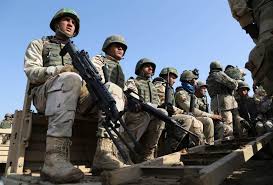Colonel Reports No Problems With Openly Gay Cadets
General Encouraged Openly Gay Student to Join Corps
SANTA BARBARA, CA — The first openly-gay cadet at the Texas A&M University Corps of Cadets finished his semester without experiencing any harassment or social cohesion problems, despite breaking a 125-year tradition by announcing to his peers that he is gay and staying in the Corps. Noel Freeman, a four-year veteran of the Air Force, which sent him to Texas A&M on a military contract, told the Center for the Study of Sexual Minorities in the Military (CSSMM), a research center at the University of California, Santa Barbara, that he served openly as a gay cadet in an environment of “respect and camaraderie that caused no problems to unit cohesion.”
Freeman announced he was gay in the fall of 2000. He remained enrolled in the University, but, in accordance with the military’s “don’t ask, don’t tell” policy, his statement cost him his contract, and he was discharged from the University’s Reserve Officer Training Corps (ROTC), which students are normally required to join in order to enroll in the Corps of Cadets.
“I couldn’t put up with the emotional trauma anymore,” Freeman said, explaining his decision to announce his sexuality. “I couldn’t put up with living a lie, with the hiding, the living in fear that someone would find out, and that I’d lose my contract.” Eventually, after de-enrolling from ROTC, he resigned from the Corps of Cadets as well. “I had just lost my contract, my career, my job, my scholarship. I was ready to kill myself.”
But after recuperating the following summer, Freeman contacted his former commander to inquire about returning to the Corps. According to Freeman, Major General Ted Hopgood, a retired 2-star marine general with 36 years of service, encouraged him to return. “Before I could even say ‘hello,’ he told me, ‘sure, you can be a Cadet. I don’t see any reason why you can’t.'”
Col. Anthony Groves, Assistant Comandant for Operations and Training at Texas A&M, acknowledged that gay members serve in the Corps of Cadets without incident. “I don’t know of any harassment or discrimination or problems” arising from the presence of openly gay cadets in the Corps, Col. Groves told researchers. He said that gays and straights have negotiated new norms for public displays of affection that are amenable to all involved. “I know they’ve had to work through some situations where a gay person said, ‘I’m thinking about doing this,’ and his classmates said, ‘we’d really rather you didn’t do that.'” Generally, he said, gays have been sensitive to the traditional image of the Corps and they have tended to respect the limits of people’s comfort levels.
Both Mr. Freeman and Col. Groves attributed the success of integration to strong leadership. Mr. Freeman said that when his commandant encouraged him to re-join his unit, it appeared that he was trying to teach a lesson in leadership. “It seemed like he wanted to say to the Corps, you’re always going to have to work with people you can’t pick and choose.” Commanders instructed the unit to treat everyone equally, and Mr. Freeman found that his peers fully accepted him. “It’s really amazing the respect and camaraderie that we have,” he said.
“The key from an organizational position,” explained Col. Groves, “is that you can’t discriminate against, or harass [gay people] in any way or do anything to make them feel uncomfortable or unwanted or out of place.” He said that there were a thousand reasons why one person might not like another, but that part of military training involved learning to work effectively with different kinds of people. Though he was not aware of any discrimination, “we would be very sensitive to it if it came up,” he added, “and we would take whatever effort was necessary to make sure that it stopped.”
Nathaniel Frank, Director of Communications at CSSMM, said the experience of gay cadets at Texas A&M adds one more layer to a mound of evidence that the military’s ban on openly gay soldiers is unnecessary. “The atmosphere in military training schools is every bit as intimate as it is in the military itself,” Frank said, adding that traditions and codes of conduct are often even stricter at training academies than in the services. “Scores of studies say that openly gay men and woman can serve effectively in the military and this experience corroborates that. If gays and straights can work, live and train together here, why not in Afghanistan?”
While ROTC programs are governed by Pentagon restrictions on openly gay soldiers, an administrative officer for the University’s Army ROTC program said he was not aware of these regulations. “I don’t know what that would say or require of us,” he said. He added that, “not knowing what the actual rules say that govern” gays and lesbians in ROTC, he had no reason to believe such students could not serve successfully in the program. “I don’t see why not,” he said.
